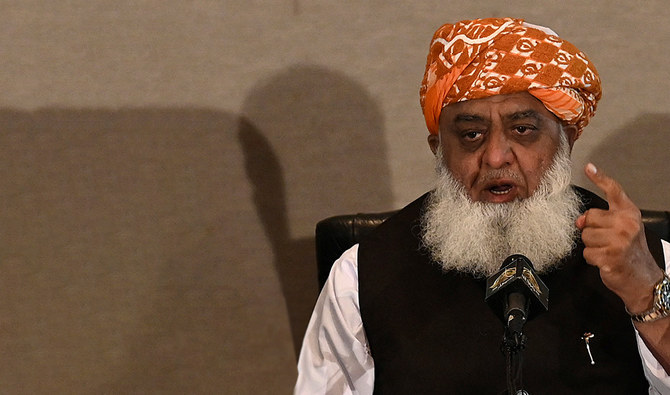ISLAMABAD: The ongoing tussle between the Pakistani government and the judiciary intensified on Thursday after the chief of the Pakistan Democratic Movement (PDM) which comprises parties in the coalition government, defied the apex court's orders to say that no one can be “bullied” into holding talks with the opposition.
The development came after a three-member bench of the apex court, led by Chief Justice Umar Ata Bandial, summoned representatives of Pakistan's major political parties to the court on Thursday. The bench asked the government and its allies to hold talks with ex-prime minister Imran Khan’s Tehreek-e-Insaf (PTI) party to finalize a date for holding elections in the country's national and provincial assemblies.
A day earlier, the Supreme Court rejected a petition filed by the defense ministry to hold polls on the same date across the country in October.
In Thursday's short order, the court said that after having heard “positive statements” from representatives of all political parties in the country, it is optimistic that all parties would agree to an election date sooner rather than later. The bench adjourned the hearing till April 27 on account of the Eid Al-Fitr holidays.
Tensions between the government and the judiciary have escalated ever since a three-member bench, led by the chief justice, ordered voting to be held in Pakistan's Punjab province on May 14. The government, on the other hand, says it is not economically viable to hold elections for two provinces on one day and in the rest of the country on another.
In response to the court’s order, Maulana Fazlur Rehman, president of the PDM, said the bench can not “bully” the ruling coalition into holding talks.
“The National Assembly has passed a law [to limit the powers of the CJP], but the way the court is trying to exercise its authority through bullying, I think the court has already lost that authority,” Rehman told reporters during a news conference.
The PDM chief was referring to the Supreme Court (Practices and Procedure) Bill, 2023, passed by the parliament and the senate last month to curtail the powers of the country’s top judge. While the bill is yet to become law, the apex court issued an interim order on April 13 to stay its implementation until further notice.
“The parliament has lost its confidence in the bench, then why should we appear before it?” he said, adding that parliament was neither obliged to appear before the bench nor was it ready to negotiate with Khan.
“He [Khan] has only been trying to create difficulties in politics and make poor decisions. Yet, the court is telling us to rally behind him. We cannot accept this coercion from the court as we think that this whole process is illegal.”
The PDM chief pointed out that there is no point in holding talks with Khan because the ex-premier had already said he would not accept election results if he doesn't win by a two-thirds majority.
“Telling us to talk to him is an insult to parliament and politics,” Rehman said. “I accept your justice, but not your gavel or your coercion”.
In a separate press conference, Foreign Minister Bilawal Bhutto-Zardari, who also heads the Pakistan Peoples Party (PPP), a key coalition partner of the government, said that while he had always tried to bring allied parties on the same page to hold dialogue with opponents, it would be “very difficult to convince the allies with a gun to our heads.”
“Holding dialogue is necessary, even if we have to talk with our opponents, to convey that we all want elections to be held across the country on the same day,” Bilawal said.
“[But] it will be very difficult, as objections have been raised in this regard and I am also in agreement with this point of view, that no one can negotiate with a gun to their head," he said.
"You cannot expect that consensus would be reached in negotiations with a gun to our heads, or that the negotiations would be successful with a gun to our heads.”
He said that the 3-2 minority decision of the bench to hold elections in May, which was being “imposed on the government” under the pretext of a majority decision, was the “gun to our heads” he was referring to.
“We still believe that talks between political parties are necessary, and if we don’t find a solution [to this impasse] then democracy and the federation will be in danger,” he said.
“Unless the order to hold talks is not stayed or suspended, as long as you’ve got this gun to our heads, how will I convince my allies to negotiate?” he said.
Since his ouster last April, ex-premier Khan has refused to acknowledge the Sharif-led coalition government and has been protesting against it. His party and its allies dissolved the legislative assemblies in Punjab and Khyber Pakhtunkhwa back in January in a bid to push early elections in the country.
According to Pakistan's constitution, elections must be held within 90 days of the dissolution of the assemblies. The government has ruled out elections before schedule, citing security threats and lack of funds, as the reasons.
















